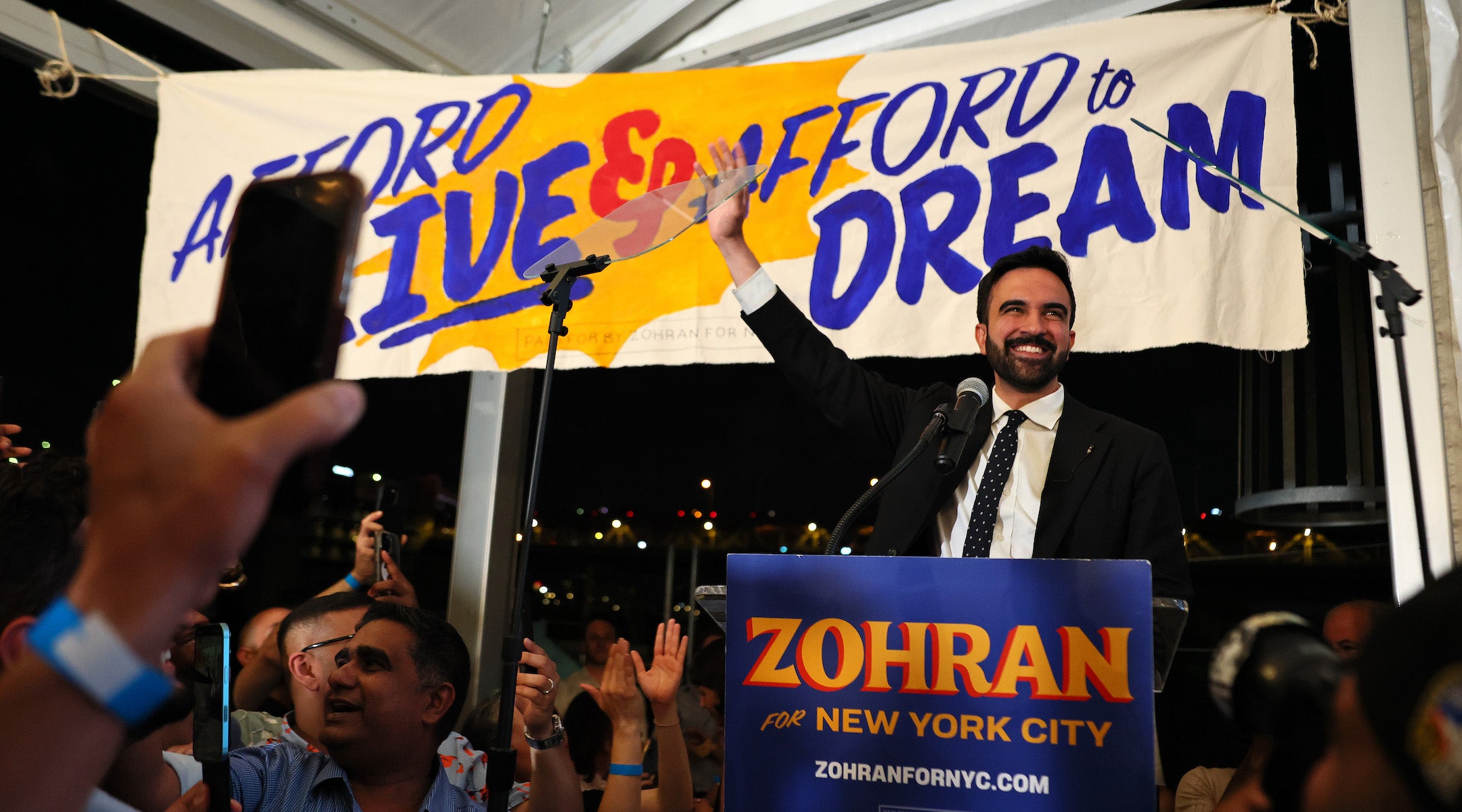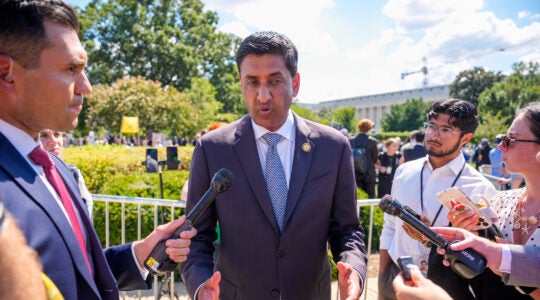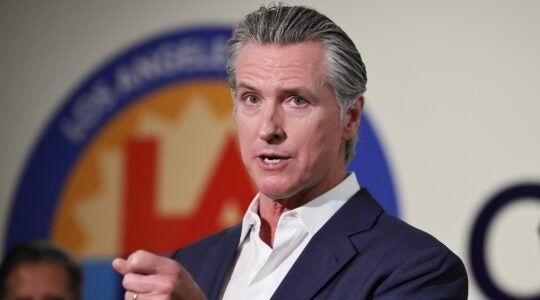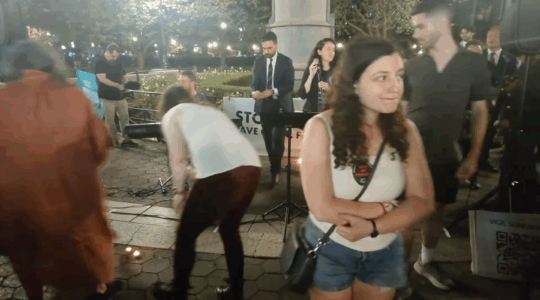Many details of Zohran Mamdani’s stunning win in New York City’s Democratic mayoral primary on Tuesday are yet to become clear, including exactly how many voters ranked him first and whom he will face in November’s general election.
But whatever happens in November, Mamdani already has earned the most support of any U.S. politician who endorses the movement to boycott Israel. His victory offers a clear sign that backing the movement, known as BDS, is hardly the red line that its critics long tried to make it.
Mamdani drew at least 432,000 votes, according to a preliminary tally, to top a crowded field of mayoral hopefuls. The second-place candidate, former Gov. Andrew Cuomo, received fewer than 362,000.
Mamdani earned nearly twice as many votes as either of the two BDS supporters in Congress, Michigan’s Rashida Tlaib and Minnesota’s Ilhan Omar, received in any of their general-election wins in much smaller districts.
The clear conclusion: In the city with the most Jews in the entire world, backing the boycott of Israel is hardly an impediment to electoral success.
“My support for BDS is consistent with the core of my politics, which is nonviolence, and I think that it is a legitimate movement when you are seeking to find compliance with international law,” said Mamdani at a recent forum at the UJA-Federation of New York.
The BDS movement — short for Boycott, Divest, Sanctions — was launched in 2005 by a coalition of Palestinian civil society organizations. It calls for boycotts, divestment and sanctions as a form of non-violent pressure on Israel for the “liberation” of Palestinians.
Jewish groups see it as unfairly singling Israel out for pressure, and say the movement’s ultimate goal — not a two-state solution but a “free Palestine” that doesn’t acknowledge a Jewish state — is essentially calling for Israel’s demise.
Jewish and pro-Israel groups devoted themselves to tracking BDS’ inroads on college campuses and opposing candidates who said they supported the movement. The American Israel Public Affairs Committee actively campaigns against the movement, lobbying for laws that make boycotting Israel illegal and identifying candidates who appear unsympathetic.
In 2022, a Super PAC associated with AIPAC said it was “proud to have played a role” in defeating Yuh-Line Niou, a BDS supporter, in a Democratic primary for the U.S. Congress seat in New York’s 10th district. The winner of that primary, Levi Strauss heir Dan Goldman, went on to win the general election.
Over the last two decades, the movement has notched some concrete wins, including endorsements from some schools and universities in the United States as well as some private companies.
But its most sweeping impact may have been found in the opposition it engendered. Joe Biden summarized the position of mainstream Democrats when he was running for president in 2020.
“The calls here in the United States to boycott, divest from, and sanction Israel are wrong. Period,” Biden said in a Jewish Telegraphic Agency questionnaire. “The BDS movement singles out Israel — home to millions of Jews — in a way that is inconsistent with the treatment of other nations, and it too often veers into anti-Semitism, while letting Palestinians off the hook for their choices.”
The strategy to make Israel boycotts illegal was also widely successful. Dozens of states have passed laws that make it illegal to do business with companies that boycott Israel and its settlements. In 2016, then Gov. Cuomo ordered stated agencies to divest themselves of companies and organizations aligned with BDS.
Pro-Palestinian groups, bolstered by the ACLU and other civil liberties groups, say such moves restrict constitutionally protected rights of freedom of expression and association.
In an interview with the journalist Peter Beinart in the left-wing Jewish magazine Jewish Currents, Mamdani discussed his support for BDS.
“I’m someone who’s been supportive of it, as I’ve been supportive of nonviolent movements to create accountability when it comes to international law,” said Mamdani. “And I think it’s important to just have that consistency, because ultimately, we are being told to accept that which is unacceptable.”
Supporters of BDS hailed his victory.
“A socialist, BDS supporter, and son of immigrants just toppled a pro-Israel machine politician,” the anti-Zionist site Mondoweiss wrote last night on X.
Mamdani has received endorsements and votes from some Jewish groups in New York, including Jewish Voice for Peace Action, a group that describes itself as anti-Zionist. JVP calls BDS “a principled, non-violent set of tactics led by Palestinian civil society and modeled after the international campaign that brought about an end to South African apartheid in 1994.”
Pro-Israel and anti-BDS critics of Mamdani understood — and lamented — the significance of his win.
“I hope this puts to rest the notion that Jews control politics. We couldn’t even elect a non-antisemite in the most Jewish city in America,” Bethany Shondark Mandel, a pro-Israel influencer and columnist, wrote on X.
“Along with all New Yorkers, the Jews of New York City are right to be concerned today. New Yorkers deserve a mayor who fights antisemitism, not incites it,” Sacha Roytman, CEO of the Combat Antisemitism Movement, said Tuesday night in a statement. Mamdani’s “disturbing record of supporting BDS and legitimizing ‘globalize the intifada’ rhetoric should be disqualifying for public office in a city home to the largest Jewish community outside of Israel.”
JTA has documented Jewish history in real-time for over a century. Keep our journalism strong by joining us in supporting independent, award-winning reporting.






